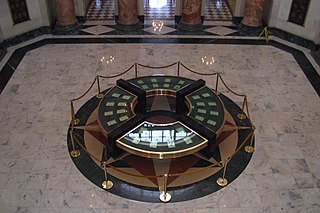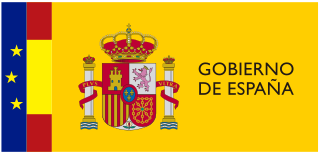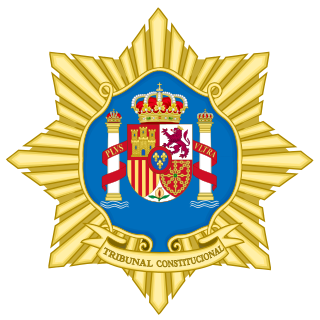Related Research Articles
The separation of powers principle functionally differentiates several types of state power and requires these operations of government to be conceptually and institutionally distinguishable and articulated, thereby maintaining the integrity of each. To put this model into practice, government is divided into structurally independent branches to perform various functions. When each function is allocated strictly to one branch, a government is described as having a high degree of separation; whereas, when one person or branch plays a significant part in the exercise of more than one function, this represents a fusion of powers.

In Spain, an autonomous community is the first sub-national level of political and administrative division, created in accordance with the Spanish Constitution of 1978, with the aim of guaranteeing limited autonomy of the nationalities and regions that make up Spain.

The president of the Republic of Costa Rica is the head of state and head of government of Costa Rica. The president is currently elected in direct elections for a period of four years, which is not immediately renewable. Two vice presidents are elected in the same ticket with the president. The president appoints the Council of Ministers. Due to the abolition of the military of Costa Rica in 1948, the president is not a commander-in-chief, unlike the norm in most other countries, although the Constitution does describe him as commander-in-chief of the civil defense public forces.

The Spanish Constitution is the supreme law of the Kingdom of Spain. It was enacted after its approval in a constitutional referendum; it represents the culmination of the Spanish transition to democracy.

The Constitution of the Commonwealth of Puerto Rico is the primary organizing law for the unincorporated U.S. territory of Puerto Rico, describing the duties, powers, structures and functions of the government of Puerto Rico in nine articles. It was ratified by the electorate of the archipelago and island in a referendum on March 3, 1952 and proclaimed into effect by Governor Luis Muñoz Marín on July 25, 1952, celebrated as Constitution Day. As the constitution of a territory of the United States, it is bound by the Constitution of the United States.

The government of Spain is the central government which leads the executive branch and the General State Administration of the Kingdom of Spain.

The Political Constitution of Colombia of 1991, is the Constitution of the Republic of Colombia. It was promulgated in Constitutional Gazette number 114 on Sunday, July 7, 1991, and is also known as the Constitution of Human Rights. It replaced the Political Constitution of 1886 and was issued during the presidency of the liberal César Gaviria, with ideas from the also liberal Luis Carlos Galán.
The Republic of Peru is a unitary state with a multi-party semi-presidential system. The current government was established by the 1993 Constitution of Peru. The government is composed of three branches, being executive, judicial, and legislative branches.

Manuel García Pelayo, prominent Spanish political scientist and jurist. He was the founder of the modern Department of Political Science of the Central University of Venezuela and was elected President of the Constitutional Court of Spain in 1980.

The current Constitution of Bolivia came into effect on 7 February 2009 when it was promulgated by President Evo Morales, after being approved in a referendum with 90.24% participation. The referendum was held on 25 January 2009, with the constitution being approved by 61.43% of voters.

Over the centuries, Turkey has had many constitutions and can be characterised by the steady establishment of a nation-state, democratisation and recognition of international law.

The Constitutional Court is the supreme interpreter of the Spanish Constitution, with the power to determine the constitutionality of acts and statutes made by any public body, central, regional, or local in Spain. It is defined in Part IX of the Constitution of Spain, and further governed by Organic Laws 2/1979, 8/1984, 4/1985, 6/1988, 7/1999 and 1/2000. The Court is the "supreme interpreter" of the Constitution, but since the Court is not a part of the Spanish Judiciary, the Supreme Court is the highest court for all judicial matters.

The Supreme Court of Costa Rica is the court of greater hierarchy of Law and Justice in Costa Rica.

The Constitution of Ghana is the supreme law of the Republic of Ghana. It was approved on 28 April 1992 through a national referendum after 92% support. It defines the fundamental political principles, establishing the structure, procedures, powers and duties of the government, structure of the judiciary and legislature, and spells out the fundamental rights and duties of citizens. It is made up of 26 chapters, not including the preamble.

Bolivia has had seventeen constitutions, including the present one, since its foundation in 1825.

Government in Spain is divided into three spheres or levels: the State itself, the regions or autonomous communities and local entities. These levels are not hierarchical, meaning there is no supremacy or primacy of one over the other, but rather they are separately defined by their jurisdictional powers.

The Peruvian Constitutional Court or Constitutional Tribunal is an independent constitutional agency of Peru that was established in the 1993 Constitution of Peru that was created during the government of Alberto Fujimori. The court's members are nominated by the Congress of Peru; these nominations sometimes lack transparency and are based on political favors that nominees can provide to legislators. Since May 2022, the Constitutional Court has been used to provide institutional strength to Fujimorists in Congress, according to IDL-Reporteros.
The history of the Constitution of Chile dates from 1811. There were 10 constitutional texts and a draft for a federal organization in 1826. Its common elements are the unitary form of state and presidentialism as a form of government.

Laura Nuño Gómez is a Spanish political scientist, researcher, and feminist activist. She is director of the Gender Studies Chair of the Institute of Public Law and the Gender Equality Observatory at King Juan Carlos University (URJC), as well as the creator of the first academic degree in Gender Studies in Spain, and of various postgraduate programs in this subject. She is the author of El mito del varón sustentador, as well as about 30 articles and books about her research. Since the enactment of the Law for Effective Equality of Women and Men, she has been one of the three expert members of the State Council for the Participation of Women.

The Constitutional Convention was the constituent body of the Republic of Chile in charge of drafting a new Political Constitution of the Republic after the approval of the national plebiscite held in October 2020. Its creation and regulation were carried out through Law No. 21,200, published on 24 December 2019, which amended the Political Constitution of the Republic to include the process of drafting a new constitution. The body met for the first time on 4 July 2021. Chilean President Sebastian Piñera said, "This Constitutional Convention must, within a period of 9 months, extendable for an additional 3 months, draft and approve a new constitution for Chile, which must be ratified by the citizens through a plebiscite." It ended its functions and declared itself dissolved on 4 July 2022.
References
- ↑ Carnota, Walter F. (2014). "Los múltiples usos del Derecho Constitucional Comparado". Anuario Iberoamericano de Justicia Constitucional (in Spanish) (18): 101–123. ISSN 1989-5585.
- ↑ Arroyo, César Landa (2015-11-01). "El derecho constitucional comparado en el ordenamiento constitucional nacional: a propósito del IX Congreso Mundial de Derecho Constitucional". Derecho PUCP (75): 11–30. doi: 10.18800/derechopucp.201502.001 . ISSN 2305-2546.
- ↑ Colón-Ríos, Joel I. (2022-09-29). "El estado del derecho constitucional comparado: ¿para qué son las constituciones?". Díkaion (in Spanish). 31 (2): e31213. doi: 10.5294/dika.2022.31.2.13 . ISSN 2027-5366.